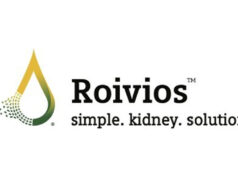 Findings from the FLOW trial, the first dedicated kidney outcomes trial with a glucagon-like peptide-1 (GLP-1) receptor agonist were reported at a symposium at the American Diabetes Association’s (ADA) 84th Scientific Sessions (21–24 June, Orlando, USA), and were simultaneously published in Nature Medicine. These results, according to the presenting researchers, demonstrate that semaglutide significantly reduces the risk of major kidney disease events and cardiovascular outcomes in patients with type 2 diabetes and chronic kidney disease (CKD). The data presented also highlighted the likely benefits of combined therapy with SGLT2 inhibitors.
Findings from the FLOW trial, the first dedicated kidney outcomes trial with a glucagon-like peptide-1 (GLP-1) receptor agonist were reported at a symposium at the American Diabetes Association’s (ADA) 84th Scientific Sessions (21–24 June, Orlando, USA), and were simultaneously published in Nature Medicine. These results, according to the presenting researchers, demonstrate that semaglutide significantly reduces the risk of major kidney disease events and cardiovascular outcomes in patients with type 2 diabetes and chronic kidney disease (CKD). The data presented also highlighted the likely benefits of combined therapy with SGLT2 inhibitors.
According to the researchers, kidney disease impacts an estimated 37 million Americans, including nearly 15% of the adult population. They state that diabetes is a major risk factor for kidney disease, and approximately one in three American adults with diabetes have CKD. The trial aimed to evaluate if semaglutide, a once-weekly GLP-1 receptor agonist, would mitigate kidney outcomes and death.
The double-blind, randomised, placebo-controlled international trial enrolled 3,533 participants with a median follow-up period of 3.4 years. The trial compared injectable semaglutide (1mg) once weekly with a placebo as an adjunct to the standard of care for the prevention of major kidney outcomes, specifically kidney failure, substantial loss of kidney function, and death from kidney or cardiovascular causes.
The study found that participants who received semaglutide experienced a 24% risk reduction of the composite primary endpoint, including kidney outcomes and death due to cardiovascular and kidney causes, compared to those who received a placebo. Researchers also found that the secondary endpoints showed significant improvements with semaglutide, including a slower estimated glomerular filtration rate (eGFR), slope of 1.16 ml/min/1.73m2/year, a reduction of major cardiovascular events by 18%, and a reduction of the risk of all-cause death by 20%.
Commenting on the newly published data, Richard E. Pratley (AdventHealth Diabetes Institute, Orlando, USA), the co-chair of the FLOW trial, stated: “This is a patient population at high-risk of severe kidney outcomes. Despite existing treatment options, there is still a clear unmet need for this group. The findings from the FLOW trial have the potential to change the disease course of these high-risk patients and pave the way for new treatment strategies, offering hope to millions of patients globally.”
Pratley et al note that new research will follow in 2024 and 2025, which will be looking into clinically relevant areas to address the unmet needs of this patient population.











